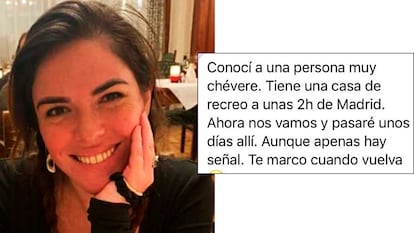The disturbing disappearance of an American woman in Madrid during a divorce involving millions of dollars
Police are still searching for Ana María Knezevich, a wealthy 40-year-old who was separating from her Serbian husband. She went missing in the Spanish capital after sending two strange text messages to friends

It is 8.30 p.m. on February 2 and a woman is chatting with her close friend, lying in bed in her home in the upscale Madrid district of Salamanca. She tells her friend that she is going to bed early, that she is tired, and does not mention any weekend plans. The conversation lasts about an hour. A day later, two people receive a message from her cell phone, but nobody believes that she wrote it.
Ana María Knezevich Henao, 40, a U.S. citizen born in Colombia, was reportedly in the middle of a difficult divorce made more complicated by the lack of agreement with her ex and also by the large amount of money involved. The missing woman had moved from Colombia to Miami 18 years ago. Thirteen years ago she married a man of Serbian nationality named David Knezevich. Together they founded three very successful technology firms providing computer support in Florida, EOX Technology Solutions, Registered Corporate Agents LLC and EOX Capital LLC. As evidenced by their social media accounts, the couple led a very comfortable life.
However, last summer their romance came to an end, and the marriage broke up. What at first the woman thought would be a friendly divorce instead became strained due to negotiations over the distribution of assets. According to sources close to the family, she wanted a 50% split for each, while her husband wanted her to keep only 25% of the assets. According to these same sources, this situation increasingly undermined her health. She was prescribed antidepressants and lived in a constant state of anxiety. Hoping to change airs, she crossed the Atlantic and settled down in Madrid, where she had visited before as a tourist and had some friends.
In late November, she moved to an apartment on Francisco Silvela Street and, according to her family, her mood and condition improved significantly. She was financially well off, and had mentioned that with what she had already made, she could spend the rest of her life without working.
On the day that she went missing, she had gone to see a house to settle permanently in Madrid. The lease on her rental was running out in March, and she needed a place to stay long-term. That night, in the telephone conversation from bed, she told her friend that she did not like the property she had visited and that she was going to keep searching. They also talked about the plans they had for a trip they would take to Barcelona the following week. They were meant to be going to the Catalan capital on February 5 to attend a talk by a psychiatrist that Ana María liked, and they would take the opportunity to spend a few days of leisure. At around 9.30 p.m. the conversation ended. At 11.30 p.m. another friend sent Ana María a message, which appears as read, although she never answered it.
That night, Ana María did not lower the blinds in her bedroom to keep the sun out in the morning, as she normally did. When the police interrogated one of her neighbors, the latter clearly remembered that she had stayed up until 1.30 a.m. and that there was still light in the home next door. Early the next day, the blinds were still up. Neighbors also say that on the same day that the woman disappeared, a man wearing a motorcycle helmet disabled the building’s security cameras with a spray can. However, sources investigating the case do not necessarily tie this event with Ana María’s disappearance, as this has happened several times in an area that is a common target for thieves.
The morning after her last phone conversation, two messages were sent out from Ana María’s phone. One, at around 2 p.m., to Sanna Rameau, a friend from Sweden. This message, written in English, claimed that she had just met an amazing man. “I met someone wonderful!! He has a summer house about 2h from Madrid. We are going there now and I will spend a few days there. Signal is spotty. I’ll call you when I get back.” The message went on to say that both felt an “amazing connection. Like I never had before.”
Sanna was tremendously surprised by that story. “She wanted to be with her people, with her friends, to be calm, she was not looking for a relationship,” confirmed family sources. Two hours later, her close friend from Madrid, who had been calling her all morning, received the same message, this time in Spanish. It looked suspiciously like an automatic translation. Another thing that caught her attention was that there were periods and commas in the text, when Ana María never bothered with them.
No signs of break-in
On Sunday, February 4, Ana María’s phone no longer gave a signal and her friend from Madrid notified the police, who obtained a warrant to access the house. The firefighters entered through the window and found the apartment empty and without any noticeable disorder. A few personal items were missing. Given that there was no trace of her, her friend filed a police report. Throughout the weekend, this woman was in touch with Ana María’s relatives, who also reside in Miami.
Her brother, Juan, contacted her husband David twice. At first, he didn’t respond. When they finally managed to talk, David assured him that he had no idea what could have happened to his wife. The second time, when the family asked him for financial support to travel to Spain or to get legal advice, he replied that this was no longer his concern, say sources close to the family. During this time, David hired the services of a criminal lawyer from Miami, Ken Padowitz, who assured the AP agency that his client had nothing to do with his wife’s disappearance, that he had been in Serbia since before her trail was lost, and that he would collaborate fully with the investigation. He also said that the reason he has not yet come to Spain or participated in any way in the search is because he does not speak Spanish and would not be useful there.
The family has filed another missing person complaint in the United States. They are all being legally advised by SOS Desaparecidos, a missing persons volunteer organization that has provided them with psychological support and legal advice. Its president, Joaquín Amills, says that the Spanish police are working closely with the FBI on the investigation. Meanwhile her two brothers, her mother and her close friends are still hopeful that they will find Ana María alive and dance with her again the cumbia that she liked so much.
Sign up for our weekly newsletter to get more English-language news coverage from EL PAÍS USA Edition
Tu suscripción se está usando en otro dispositivo
¿Quieres añadir otro usuario a tu suscripción?
Si continúas leyendo en este dispositivo, no se podrá leer en el otro.
FlechaTu suscripción se está usando en otro dispositivo y solo puedes acceder a EL PAÍS desde un dispositivo a la vez.
Si quieres compartir tu cuenta, cambia tu suscripción a la modalidad Premium, así podrás añadir otro usuario. Cada uno accederá con su propia cuenta de email, lo que os permitirá personalizar vuestra experiencia en EL PAÍS.
¿Tienes una suscripción de empresa? Accede aquí para contratar más cuentas.
En el caso de no saber quién está usando tu cuenta, te recomendamos cambiar tu contraseña aquí.
Si decides continuar compartiendo tu cuenta, este mensaje se mostrará en tu dispositivo y en el de la otra persona que está usando tu cuenta de forma indefinida, afectando a tu experiencia de lectura. Puedes consultar aquí los términos y condiciones de la suscripción digital.









































